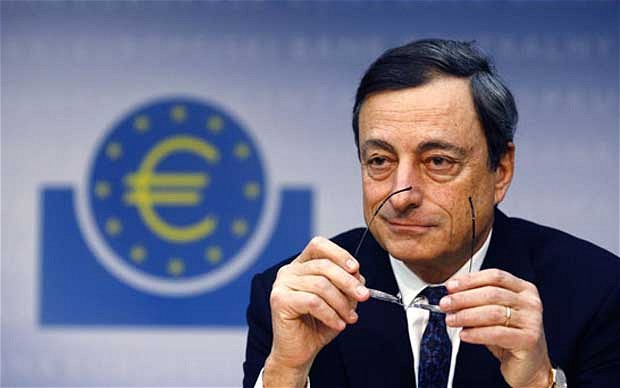By BRIAN BLACKSTONE, Wall Street Journal
FRANKFURT—European Central Bank President Mario Draghi dismissed calls for the central bank to help Greece reduce its crushing debt burden, putting the onus on euro-zone governments to find the money needed to give Athens more time.
Mr. Draghi's stance could complicate efforts to find as much as €30 billion ($38 billion) Athens may need to plug a financing gap that Greece would face if Europe and the International Monetary Fund agree to give the country more time to meet its fiscal targets.
"The ECB is by and large done," Mr. Draghi said at his monthly news conference when asked what the bank could do to help Greece. The ECB's board, at its monthly policy meeting, voted to keep its policy rate unchanged at 0.75%, as expected.The ECB holds €40 billion in Greek bonds it bought in 2010. The central bank is under pressure from some governments to, at a minimum, find ways to redirect any profits it makes on these bonds straight to Athens, providing as much as €8 billion in debt relief.
As part of a Greek rescue package struck earlier this year, the ECB said its member banks would pass along Greek bond profits to their national governments, as part of the normal system; then it would be up to those governments to send the money to Greece. But that doesn't provide immediate relief, and still leaves it up to political leaders to channel funds to Athens. ECB officials say it is legally possible to sell the ECB's Greek bonds to Europe's rescue fund at the discounted price the ECB paid, but it is unclear whether participating national governments are willing to find the money to buy the debt.
"I'm not sure how they square the circle" on Greece without the ECB's help, said Ken Wattret, economist at BNP Paribas BNP.FR +1.29% . Mr. Draghi's comments "put more pressure on governments to come up with a comprehensive agreement," he said.
Early Thursday, Greece's Parliament took a key step toward obtaining €31.5 billion in financial aid by passing a multibillion-euro austerity package at the insistence of its international creditors. "This represents real progress," Mr. Draghi said.
Still, Greece needs to find an extra €30 billion to reduce its debt load, which is estimated to equal nearly 190% of its gross domestic product next year.
European governments have thus far refused to take losses on their loans to Greece. One other option is to reduce the interest rate Athens pays on the loans, though that wouldn't bring significant relief. ECB officials won't take any losses on the central bank's bonds, either, saying it would be tantamount to illegal financing of governments.
Mr. Draghi's remarks Thursday "push governments to two extremes, meaning they would have to take losses, or [initiate] a third rescue package," said Carsten Brzeski, economist at ING Bank.
Mr. Draghi hinted that the Greek parliamentary vote was enough to allow the ECB to cut the country some short-term slack by increasing the amount of emergency lending it provides to Greek banks, something he said was a legitimate part of the ECB's tool kit. If the banks are allowed to borrow more in the form of emergency loans, which are run by Greece's central bank with the approval of the ECB, then they could use the money to buy more short-term debt from the government, enabling it to repay other debts that mature later this month and stave off a default.
Mr. Draghi also played down chances that the central bank would consider new measures to stimulate the region's economy as a whole.
In contrast to other major economies such as the U.S. that are showing signs of recovery, the euro zone appears poised for a prolonged downturn. The European Commission this week shaved its forecast for 2013 euro-zone GDP growth to 0.1% from 1%. GDP is expected to shrink 0.4% this year.
The bloc's largest economy, Germany, is showing signs of strain after weathering Southern Europe's debt crisis the past two years. Slides in industrial production and exports point to a decline in fourth-quarter GDP of 1% at an annualized rate, said J.P. Morgan JPM -0.20% economist Greg Fuzesi.
Mr. Draghi suggested the central bank won't do much more to revive the bloc's economy, although he didn't exclude another rate cut. Annual euro-zone inflation is 2.5%, above the ECB's 2% target. But officials expect it to decline into next year. Underlying price pressures, Mr. Draghi stressed, "should remain moderate." He dismissed concerns about prolonged price declines, known as deflation, saying weak prices in some of the bloc's stressed economies are a "necessary" process to restore competitiveness.
He ticked off a number of measures the bank has taken in the past year, including three interest-rate cuts and long-term loans to banks. The ECB's decision two months ago to create a new bond-buying program has calmed financial markets, and "by itself has been the equivalent" of monetary-policy stimulus, Mr. Draghi said.
"I think the odds of a rate cut next month have come down," said Nick Matthews, economist at Nomura International.
Under the new bond program, the ECB will purchase potentially unlimited amounts of government bonds of Spain and other vulnerable euro members. The caveat, however, is that governments first request aid from Europe's bailout funds and agree to reduce deficits and undertake economic overhauls.
Madrid has been reluctant to take these steps, instead pressing the ECB for clarity on how much help it would provide. "The most important thing is to know what it means for the [ECB] to buy bonds on the secondary market," Prime Minister Mariano Rajoy said this week. "Because if [borrowing] costs stay at the same level, then a [bailout] doesn't make much sense."
The ECB "cannot give any assurance," Mr. Draghi said, saying there was no "quid pro quo" that the ECB will automatically deliver on bond-buying even if governments take the aid-request step.









